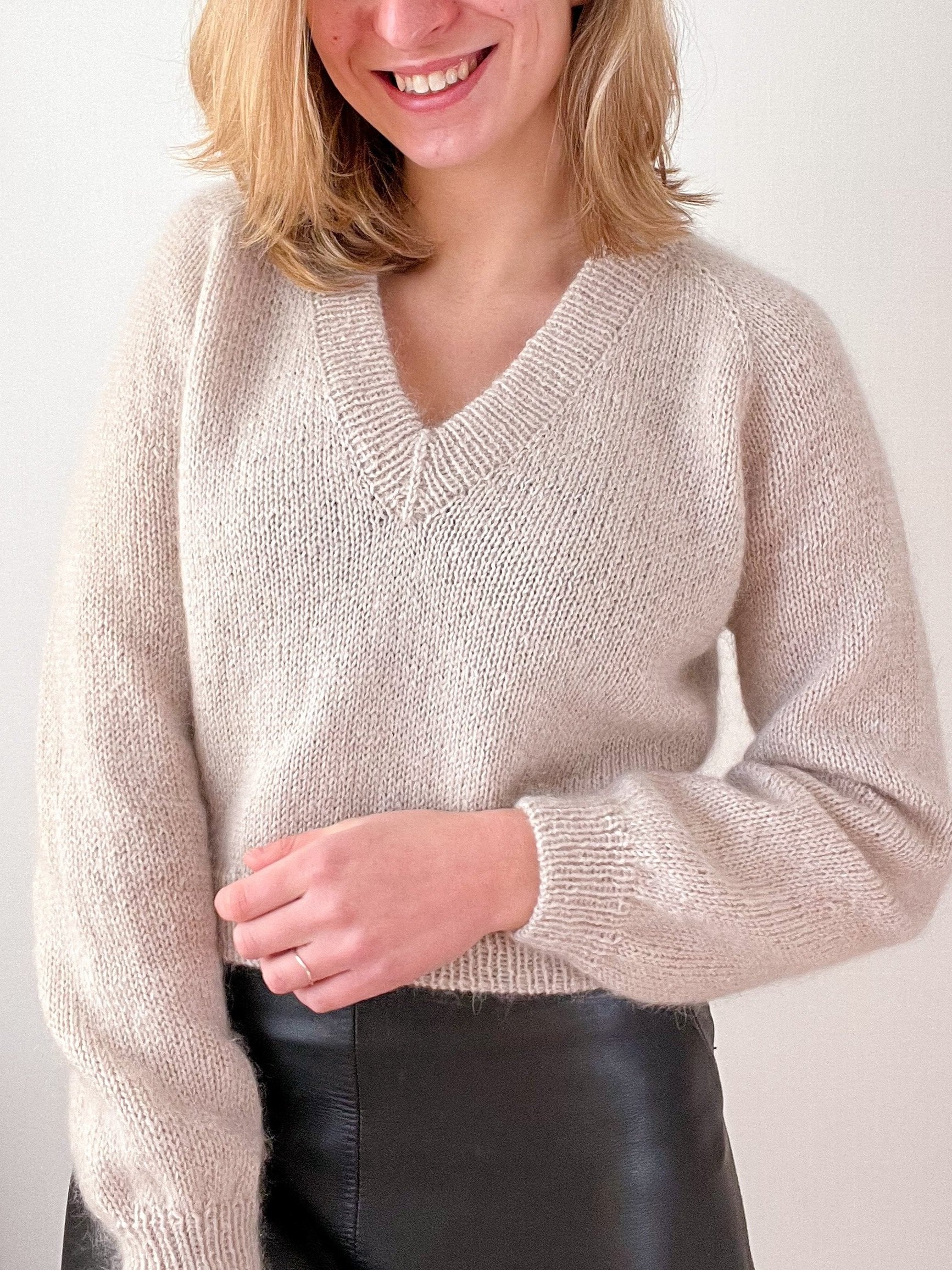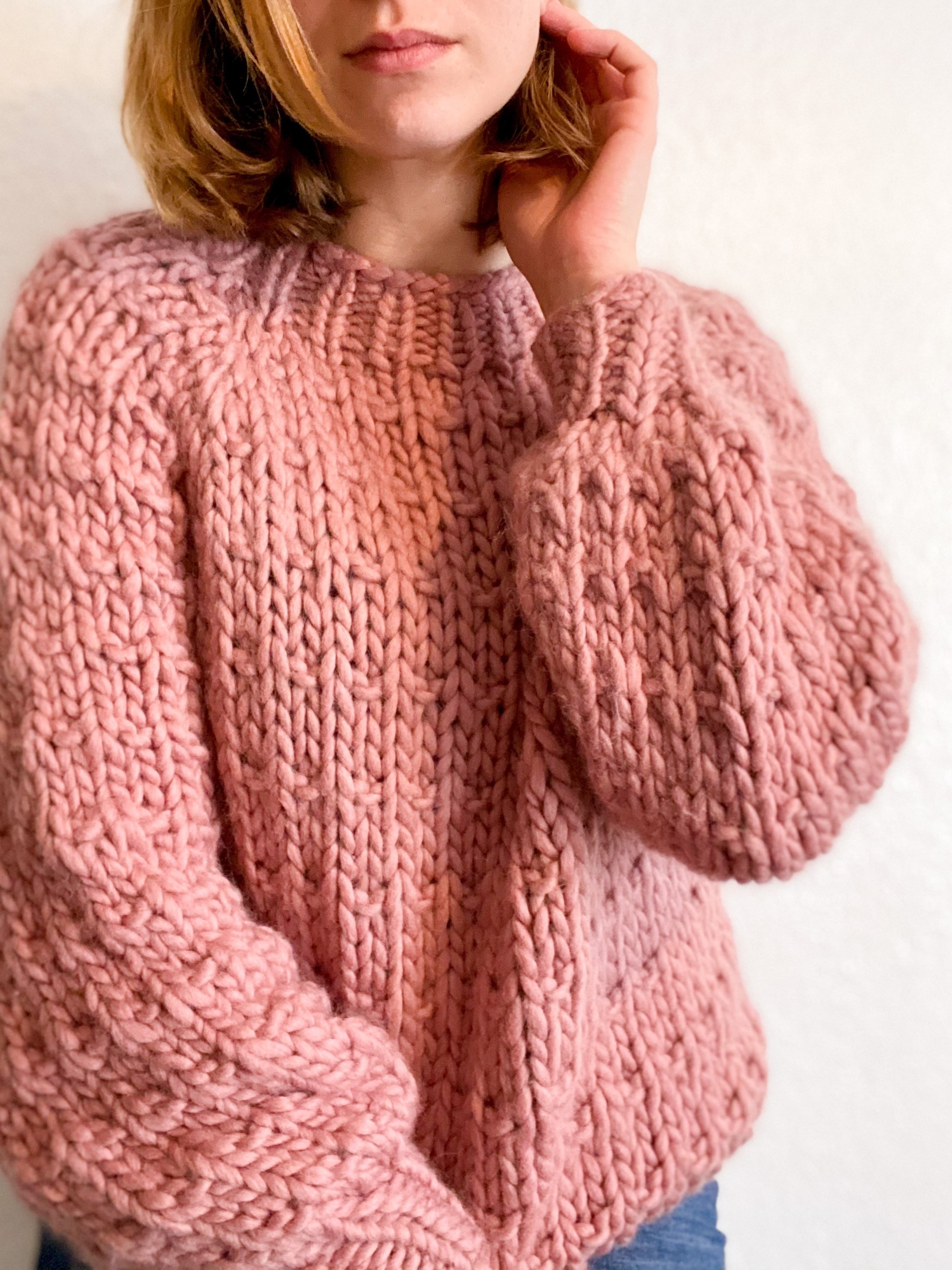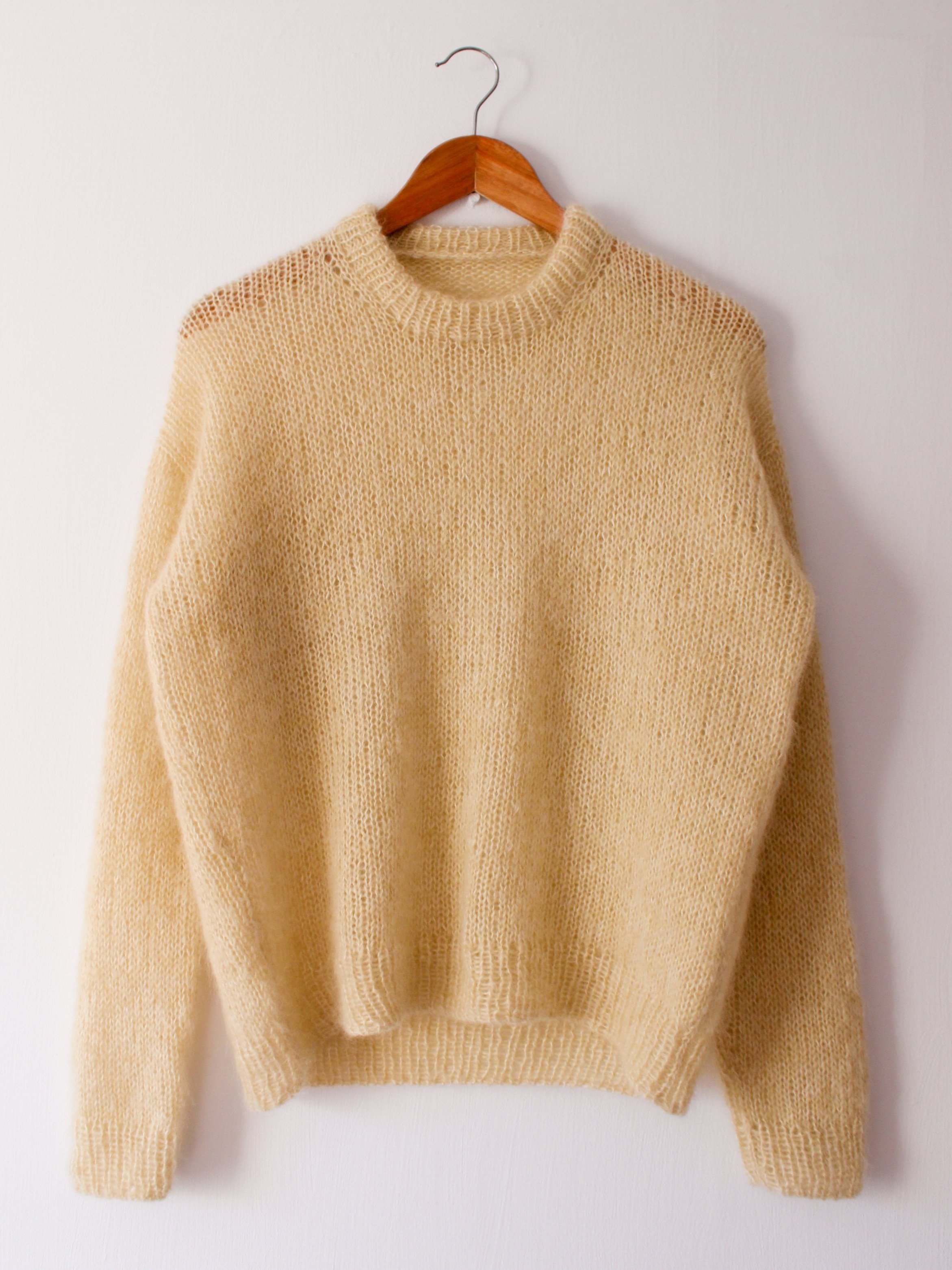Pippin Sweater
The Pippin Sweater is a classic raglan sweater with a textured twist. The sand stitch pattern looks impressive but is surprisingly easy to work. It is named after my sweet cat, Pippin, who tried to eat my yarn at every opportunity. I hope you’ll like the sweater as much as he does!
The sweater itself is worked in sand stitch, top-down and in the round, using a DK-weight yarn or a combination of fingering- and lace-weight yarns. It starts with a double-folded collar and then is shaped with some German short rows and raglan shaping. Once the yoke is finished, you will leave the sleeves to rest and work the body to your desired length. You will then pick up the stitches for the sleeves and work them with some gentle decreases to create a slight taper. I recommend that you finish the body and sleeves with tubular cast-offs, but you can use your preferred method.
This is a pattern is of easy-to-intermediate difficulty. The construction uses a compound raglan, meaning that the increase rate changes throughout the yoke for each size to achieve a good fit. This is quite straightforward in practice but it can make the written instructions look more complicated. You will also need to be able to maintain the sand stitch pattern throughout the sweater.
Please note that this is a digital pdf and not a physical knitting pattern.
The Pippin Sweater is a classic raglan sweater with a textured twist. The sand stitch pattern looks impressive but is surprisingly easy to work. It is named after my sweet cat, Pippin, who tried to eat my yarn at every opportunity. I hope you’ll like the sweater as much as he does!
The sweater itself is worked in sand stitch, top-down and in the round, using a DK-weight yarn or a combination of fingering- and lace-weight yarns. It starts with a double-folded collar and then is shaped with some German short rows and raglan shaping. Once the yoke is finished, you will leave the sleeves to rest and work the body to your desired length. You will then pick up the stitches for the sleeves and work them with some gentle decreases to create a slight taper. I recommend that you finish the body and sleeves with tubular cast-offs, but you can use your preferred method.
This is a pattern is of easy-to-intermediate difficulty. The construction uses a compound raglan, meaning that the increase rate changes throughout the yoke for each size to achieve a good fit. This is quite straightforward in practice but it can make the written instructions look more complicated. You will also need to be able to maintain the sand stitch pattern throughout the sweater.
Please note that this is a digital pdf and not a physical knitting pattern.
The Pippin Sweater is a classic raglan sweater with a textured twist. The sand stitch pattern looks impressive but is surprisingly easy to work. It is named after my sweet cat, Pippin, who tried to eat my yarn at every opportunity. I hope you’ll like the sweater as much as he does!
The sweater itself is worked in sand stitch, top-down and in the round, using a DK-weight yarn or a combination of fingering- and lace-weight yarns. It starts with a double-folded collar and then is shaped with some German short rows and raglan shaping. Once the yoke is finished, you will leave the sleeves to rest and work the body to your desired length. You will then pick up the stitches for the sleeves and work them with some gentle decreases to create a slight taper. I recommend that you finish the body and sleeves with tubular cast-offs, but you can use your preferred method.
This is a pattern is of easy-to-intermediate difficulty. The construction uses a compound raglan, meaning that the increase rate changes throughout the yoke for each size to achieve a good fit. This is quite straightforward in practice but it can make the written instructions look more complicated. You will also need to be able to maintain the sand stitch pattern throughout the sweater.
Please note that this is a digital pdf and not a physical knitting pattern.
Materials & Fit
Notions: 3 mm US 2.5nd 80-/100-cm 16-, 32-, and/or 40-in cord) and 4 mm US 60-, 80-, and/or 100-cm 16-, 24-, 32-, and/or 40-in cord) circular needles.
You will also need 8 stitch markers, one of which should be in a contrasting colour, and at least one clip-on stitch marker, a darning needle, some shirring elastic for the collar, and some spare needles/scrap yarn/stitch holders on which the stitches of the sleeves will rest.
Tension: 22 sts x 34 rounds in sand stitch on 4 mm needles. Make sure to wash and block your swatch for the most accurate results. Please note that I have tighter-than-average row gauge, but this isn’t too important in this pattern. You may wish to go up or down a needle size, working in 0.25/0.5 mm 0.5/1 US needle size increments as needed, to meet gauge.
Yarn: Approximately 10 (11) 12 (12) 13 (14) 15 (15) 16 (17) 19 skeins of Cardiff Cashmere Classic (100% cashmere; 112 m 122 yds /25 g). The sample garment was made in Size D in the colour 509 Silver Beige.
This works out to be 1120 (1232) 1344 (1344) 1456 (1568) 1680 (1680) 1792 (1904) 2128 m 1225 (1347) 1470 (1470) 1592 (1715) 1837 (1837) 1960 (2082) 2327 yds of yarn.
Please note that if you are working with 2 yarns held together you will need this quantity of both yarns.
Where possible, buy more yarn than you need to avoid issues with dye lots.
Yarn alternatives: Any light DK/sport-weight yarn with good stitch definition will be a good option here. Kremke Soul Wool Eco Cashmere (100% cashmere; 112 m 122 yds/25 g) is a good alternative used by some test knitters. Lamana Como (100% merino wool; 120m 131 yds/25 g) is the right weight and knits up similarly to Cardiff Cashmere Classic. Woolyknit DK Warth Mill British Wool Balls (100% British wool; 204 m 223 yds/100g) will achieve the correct gauge but will produce a heavier and coarser fabric. Test knitters had a lot of success using a combination of fingering-weight wool with a single strand of mohair.
Sizing and ease: The Pippin Sweater has about 5-9 cm 2-3.5 in positive ease for Sizes A-H, and 5-12 cm 2-4.75 in positive ease for Sizes I-K. If you would like a closer fitting or looser garment, size up or down accordingly.
Size: A (B) C (D) E (F) G (H) I (J) K
Chest measurement (cm): 75-80 (80-85) 85-90 (90-95) 95-100 (100-105) 105- 110 (110-115) 115-125 (125-135) 135-145
Chest measurement (in): 29.5-31.5 (31.5-33.5) 33.5-35.5 (35.5-37.5) 37.5-39.25 (39.25-41.25) 41.25-43.25 (43.25-45.25) 45.25-49.25 (49.25-53.25) 53.25-57
Actual circumference of garment (cm): 84 (89) 93 (98) 104 (107) 113 (118) 127 (136) 147
Actual circumference of garment (in): 33 (35) 36.5 (38.75) 40.75 (42.25) 44.5 (46.5) 50 (53.75) 58














